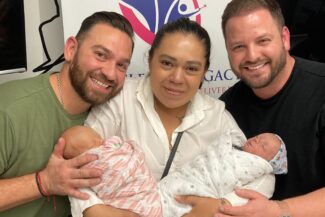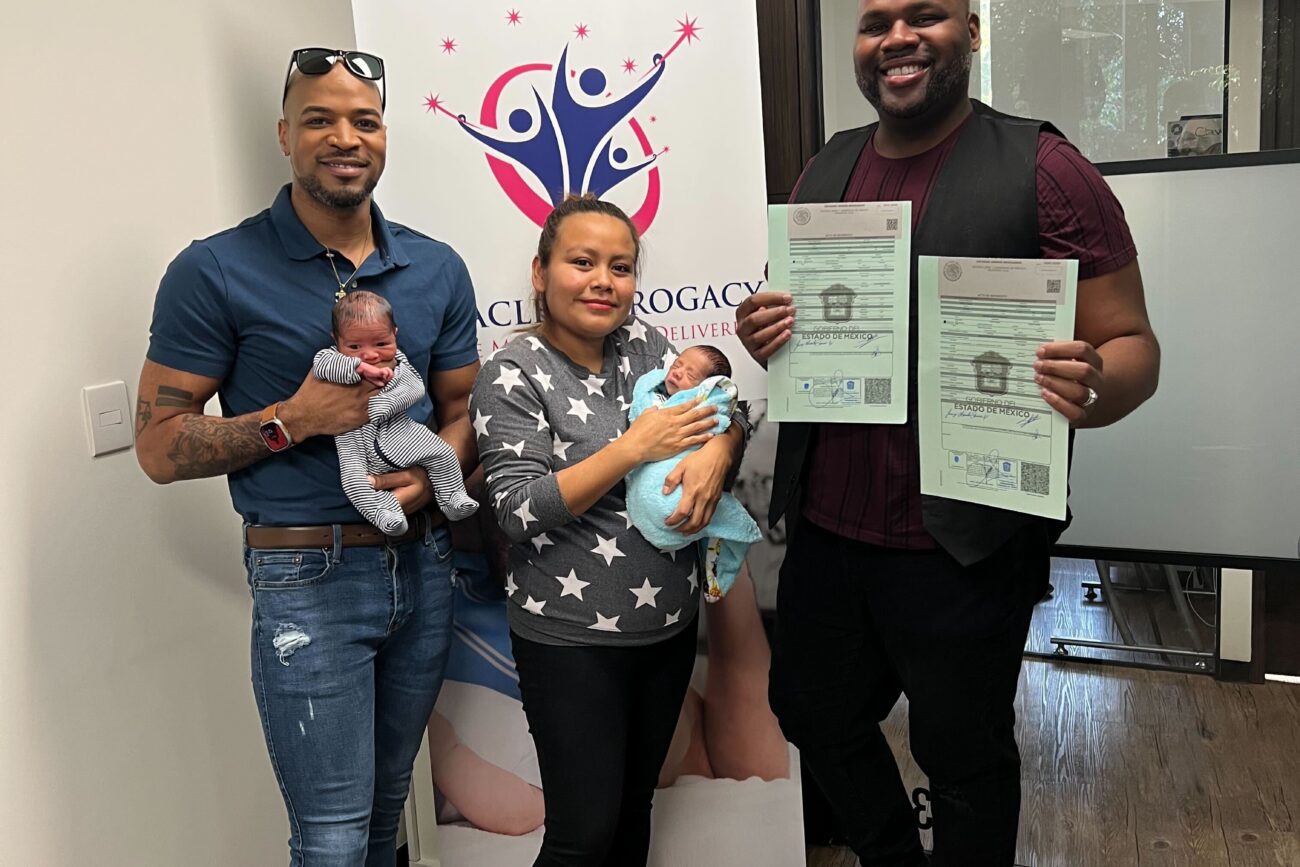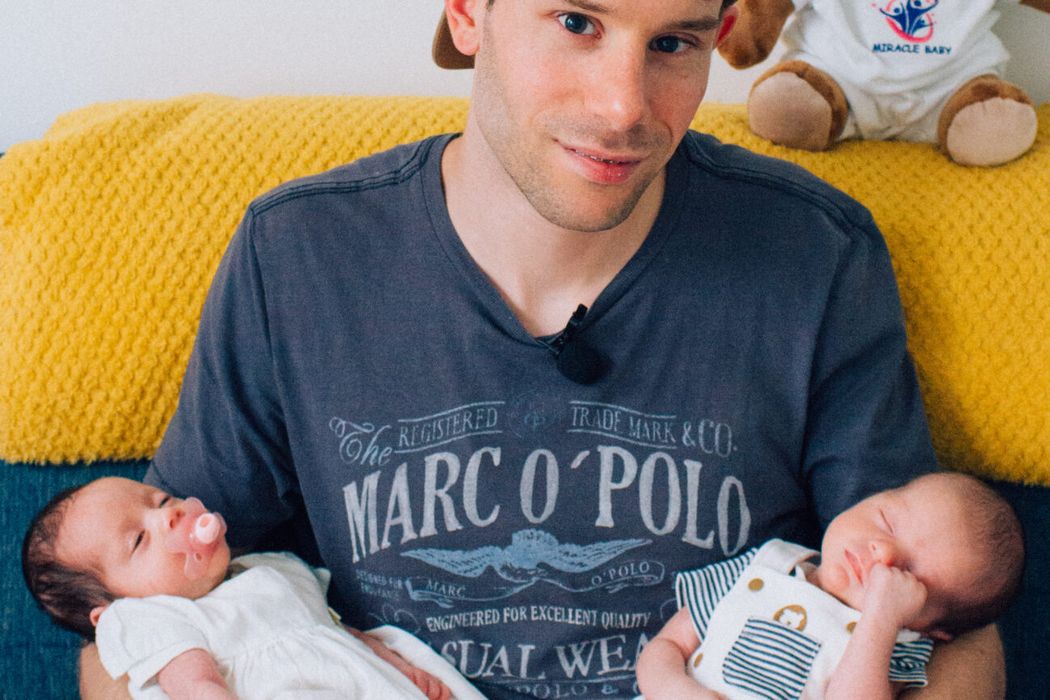Frequently Asked Questions
MIRACLE Surrogacy understands that starting the surrogacy journey can be a little overwhelming. We have been right where you are…wondering where to begin, what to do next, and not knowing where to turn for help. Don’t worry….we will be by your side throughout your entire surrogacy journey. We know you have many questions and it is our pleasure to help you by thoroughly and transparently answering them. If you still have more questions after reviewing these frequently asked questions about surrogacy in Mexico, please schedule a call with us: www.miraclesurrogacy.com/schedule
Top faq
Why Choose MIRACLE Surrogacy for Surrogacy in Mexico?
MIRACLE Surrogacy was started in 2014 by Brian Yaden and his husband Henry who had their own personal experience of having a child through surrogacy that same year. After 5 years, with more experience, they decided to complete the family and had their second daughter. Their experiences served as inspiration to create Miracle Surrogacy and help hundreds of people who dream like them, to form or expand their family.
Within a short time, Miracle Surrogacy became the largest surrogacy agency in Mexico, with a team of 50+ passionate professionals and surrogacy experts. With their expertise and a dedicated team, MIRACLE Surrogacy provides exceptional support to intended parents, making their surrogacy journey a fulfilling and successful one.
MIRACLE Surrogacy, headquartered in the United States, offers full-service surrogacy programs in Cancun, Mexico City, and Merida, all in Mexico. These programs are fully legal and available to LGBTQ and heterosexual couples, singles, and HIV+ intended parents.
Ten Key reasons to choose Miracle Surrogacy for Surrogacy in Mexico:
1. Affordable – only 1/3 the Cost of Surrogacy in the USA:
The cost of surrogacy in Mexico with Miracle Surrogacy starts at $52,800 USD (including baby delivery, surrogate, medical procedures—everything you need to have your little Miracle—for intended parents who already have their own embryos. We also have surrogacy programs with egg donors, and also programs for couples who don’t need an egg donor, i.e. self-cycle surrogacy programs. We are also proud to help HIV+ intended parents with surrogacy in Mexico.
2. Matching with Surrogate and Embryo Transfer in 8 to 10 Weeks:
We are the ONLY agency with a surplus of fully screened surrogates. The means IPs are matched and embryo transfers take place within 10 weeks of the embryos being ready—truly lightning speed. Other agencies just can’t get enough surrogates because they all want to work for Miracle Surrogacy as we pay them significantly more and treat them like family. Other agencies in Mexico take up to 18 months to match IPs with surrogates. In the USA and Canada, waits often exceed 2 years.
3. Birth Certificates issued in ONLY the Names’ of the Intended Parents (Surrogate’s Name will Not be on the Birth Certificate):
IPs with Miracle Surrogacy will receive their babies’ birth certificates in their names only (surrogates’ names will not be on the birth certificate), for those IPs who choose to do the Judicial Amparo Process. Miracle Surrogacy and its specific outside attorney are well known as the leading experts in Mexico with this process, which takes only about 4 weeks after the baby is born. This process ensures the surrogate has no parental rights.
4. 150+ Babies Per Year! More than every other Surrogacy Agency in Mexico Combined!
We have more babies than every other agency combined. In 2024 we will exceed 150 babies. This means we have many happy new parents who are more than willing to talk about their experiences with Miracle Surrogacy. We are happy to connect you to former IPs who have had a baby with Miracle Surrogacy in Mexico. Many other agencies struggle to connect prospective IPs with real, verifiable parents who had babies in Mexico
5. 10+ Years of Experience – Longer than any other Surrogacy Agency in Mexico:
We are the longest-established agency in Mexico, with more than 10 years of experience. This means we have a proven track record, that is verifiable. Most other agencies in Mexico are start-ups with no proven track record.
6. 50+ Staff Members:
We are the largest surrogacy agency in Mexico with more than 50 English-speaking staff members who work directly for Miracle Surrogacy. This means better service. Most other agencies have few or no staff in Mexico and just rely on clinic employees to manage everything.
7. Founded by Parents who had their Children via Surrogacy:
We were founded by parents who had two children via surrogacy; this makes us special, as the foundation of our company is built on empathy; we truly understand what it feels like to be in the shoes of an IP. To learn more about Miracle Surrogacy, our history, why we are the best option for surrogacy in Mexico, and who we are, please watch this short video here
8. Largest Collection of Egg Donors who Work Exclusively with Miracle Surrogacy:
We have the largest collection of egg donors, nearly 200 of them, who are college educated, and very internationally diverse.
9. Outstanding Success Rates:
Miracle Surrogacy’s success rates for surrogacy in Mexico are comparable to top fertility clinics performing surrogacy in the United States.
10. Our Surrogates are Special—and We Treat them like Family!
We treat our surrogates like family; we value them and truly appreciate the sacrifice they are making for our surrogacy journeys. Our company founded the Miracle Surrogacy Foundation that helps surrogates and their own families with education programs, maternity clothes, toys and clothes for their own children and economic assistance beyond what they receive in our surrogacy programs. Check it out here!
Is Surrogacy Legal in Mexico?
Surrogacy in Mexico is 100 percent legal. In 2021, the Supreme Court of Mexico ruled that having children is a human right, even via commercial surrogacy. MIRACLE Surrogacy has had hundreds of babies through its surrogacy programs in Mexico, including surrogacy for gay and heterosexual couples and single intended parents as well, and also surrogacy for HIV+ intended parents. The hundreds of intended parents we have helped are from all over the world: The United States, Canada, Australia, the United Kingdom, China, Singapore, Ireland, Belgium, Denmark, and many more countries, all without any problems at all.
What is the Exit Procedure (Getting back home with your baby)?
After your baby is born, there are two options for obtaining the birth certificate for your baby: you can choose to do the Judicial “Amparo” Process working with our specific outside attorneys to obtain a judicial order that ensures your baby’s birth certificate is issued in your name only and the name of your spouse/partner (this process takes about 4 weeks after birth); or, you can choose to have the birth certificate issued in only the name of the biological father and the name of your surrogate (this process takes about 10 days). Our staff will help you with either option you choose. We always seek to simplify things for you, making the whole process very easy. Your baby will automatically be a Mexican citizen, so it is possible to obtain a Mexican passport. However, we recommend securing citizenship for the baby from your home country’s embassy.
The exit procedures for obtaining your baby’s passport and returning home with your baby depend on your country of citizenship. For most countries, it is very easy and requires obtaining a passport for your baby from your country’s consulate near Cancun or embassy in Mexico City. For citizens of the United States and Canada, it takes only 2 to 3 weeks on average to complete the process, obtain your baby’s passport and return home with your baby (4 weeks if you choose the Judicial Amparo Process). For Australian citizens, it takes about 3 weeks as well. For other countries, it could vary.
Feel free to ask us about the exit process for your country of citizenship. While it is ultimately your responsibility for working with your government through its embassy or immigration bureau to determine the procedures and obtain citizenship for your baby, we are more than pleased to share our guidance with you based on our experience...
What names appear on the birth certificate? What about pre-birth orders?
For citizens of most countries including the United States, we recommend using the Judicial Amparo Process to have both intended parents’ names on the birth certificate (the surrogate’s name will not appear). The process is completed using our specific outside attorney in Mexico and takes about 4 weeks after birth. In the absence of choosing this process, the biological father and surrogate’s names will be on the baby’s Mexican birth certificate. Miracle Surrogacy and its specific outside attorney are industry experts and work quickly and efficiently to obtain your baby’s birth certificate whether you choose the Judicial Amparo Process or not. The cost of doing the Judicial Amparo Process is approximately $6,500 USD and is paid directly to our specific outside attorney; the documents needed for the process preferably will be assembled around week 24-26 of pregnancy to have everything ready to file the petition within 3 days after the baby’s birth.
Even with the Judicial Amparo Process, we still recommend that the intended parents have the surrogate sign documents permanently relinquishing her rights, allowing the intended parents to travel with the child and similar documents (we will supply the documents and arrange for your surrogate to sign them in front of a notary).
For US citizens, the United States embassy will also issue a document called the Consular Report of a Birth Abroad (CRBA) with only the name of the biological parent who is a United States citizen and the biological parent’s spouse. If you did not choose the Judicial Amparo Process, when you get back to the United States, it is advisable to terminate the surrogate’s parental rights in a local family court. The documents to accomplish this should be prepared by an attorney prior to the birth of your baby; the surrogate should sign these documents after the birth of your baby, but before you obtain the baby’s passport. We can help arrange the signing of these documents (this is very common and MIRACLE Surrogacy assists new parents with this step routinely). It is advisable to check with a family attorney to determine if the non-biological parent should do a step-parent or second-parent adoption, as it may or may not be necessary. If you do choose the Judicial Amparo Process, per our specific outside attorney, no additional legal steps are required in most cases when you return home with your child, as the surrogate’s rights are terminated via the Judicial Amparo Process (we recommend you consult with a local family attorney who specializes in international assisted reproductive technology cases).
Pre-birth orders are not possible nor are they needed, given the Judicial Amparo Process which takes place immediately after birth..
I am not a United States Citizen and I want to be the biological father. Can my baby still secure United States Citizenship?
Babies born through surrogacy in Mexico are legally citizens of Mexico, but also of the country of citizenship of the biological father. So if the biological father is a citizen of the United States (and has resided in the United States for at least 5 years as an adult), the baby will be granted United States citizenship and a U.S passport in less than 2 to 3 weeks after the baby is born. The great news is, even if the biological father is not a United States citizen, but his legal spouse is, the baby will still be granted United States citizenship (only one of the intended parents must be a United States citizen).
I am from Australia. Can I do surrogacy in Mexico?
Absolutely you can! Surrogacy is legal for Australians in Mexico. Our surrogates receive economic assistance throughout the program for medical expenses, lost wages, food/sustenance, clothing, and other items. We have successfully helped many Australian citizens have babies through our surrogacy programs in Cancun, Mexico City and Merida. The timeframe to complete the exit process and obtain your baby’s “citizenship by descent” and Australian passport varies, but is currently around 3 weeks.
MIRACLE Surrogacy is very proud to have received the full endorsement of Growing Families, a non-profit surrogacy advocacy group in Australia, which has visited our offices in Cancun and Mexico City as well as our fertility partner clinics.
Does MIRACLE Surrogacy help people have babies from other countries?
We sure do! Surrogacy in Mexico is fully legal, and we have clients from all over the world, including the United States, Canada, Australia, the United Kingdom, China, Singapore, Ireland, Belgium, Denmark, and many more countries.
financial questions
What is the cost of Surrogacy in Mexico?
While surrogacy in the United States can be as much as $150,000 USD to over $200,000 USD, the cost of surrogacy in Mexico with MIRACLE Surrogacy is approximately $59,300 USD for full-service surrogacy programs in Cancun, Mexico City or Merida, Mexico. This includes the egg collection, semen deposit, surrogate payments, baby delivery allowance for an uncomplicated delivery, agency fee, and everything in between. If an egg donor is needed, MIRACLE Surrogacy egg donors cost generally between $9,500 USD and $12,500 USD for most egg donors. If you already have your own embryos and wish to ship them to us, the cost is significantly less (see below).
All payments are made via wire transfer to MIRACLE Surrogacy’s United States bank account in US Dollars and are paid in the following stages:
- Stage 1 payable at contract signing/egg donor selection: $23,900 USD plus $1,500 USD for the semen deposit (including freezing for 6 months); plus, the cost of your egg donor (generally between $9,500 USD and $12,500 USD) plus a fully refundable $4,000 USD medical escrow payment for any medical emergencies that might arise and any medical costs not covered. This covers the semen deposit/handling and freezing for six months; the egg collection, egg donor compensation, all medicines and medical charges; the fertilization of the eggs with your semen; the embryo development/embryology; and the transfer of up to 2 embryos to your assigned MIRACLE Surrogacy surrogate and first pregnancy tests (including all medical charges, medicines, the surrogate payment for the embryo transfer, Beta pregnancy test, Gestational SAC ultrasound and the ultrasound to detect the fetal heartbeat).
- Stage 2 payable at positive pregnancy (defined by ultrasound revealing “heartbeat”): $7,650 USD for 9 months of prenatal / antenatal care payable to our United States bank account plus $500 per month payable directly to your surrogate’s bank account.
- Week 16 Agency fee: The only fee charged by MIRACLE Surrogacy is $2,850 USD, payable at Week 16 of pregnancy, which helps us offset our costs, given the very low costs of our surrogacy programs in Mexico.
- Stage 3 payable at Week 24 of pregnancy: $18,900 USD (includes surrogate’s final economic assistance payment of $11,600 USD, $1,800 USD to cover other agency program costs, plus $5,500 USD baby delivery allowance at local, private hospital. If the delivery charges exceed this amount, the client is responsible for the difference; but this is currently sufficient for a non-complicated, vaginal delivery of a baby at one of our private hospitals in Cancun or Mexico City; typically, a C-section is performed, resulting in a cost of $2,500 USD, which is deducted from your medical escrow). We hold the final surrogate payment of $11,600 USD in escrow until the baby is born and turned over to the intended parents and after the surrogate has accompanied you to the consulate or embassy to help assist with the citizenship/passport application process.
How much does Surrogacy Cost in Mexico if I already have my own Embryos?
For clients who already have their own embryos, the Stage 1 payment is only $18,900 USD plus the refundable medical escrow; however, they must pay $1,950 USD (pre-Stage 1) for the Mexican Health Department genetic materials importation permit process plus the cost of international shipment of the embryos using our contracted shipping company, licensed to ship genetic material in a special cryo-tank. Please ask us for more details. The week 16 agency fee and Stages 2 and 3 are the same as what is listed above. The total cost is approximately $52,800 USD (not including the shipping permit and embryo shipping costs, which vary depending on your location) for full-service surrogacy programs in Cancun, Mexico City or Merida, Mexico, including the birth of the baby, surrogate payments, agency fee, and everything in between.
How much does Surrogacy Cost in Mexico if I will be using my own eggs (if I don’t need an egg donor)?
For clients who already have their own eggs who do not need an egg donor (normally heterosexual couples, where the female partner is able to still produce healthy eggs), the Stage 1 payment is the same; however, there is no need to pay the egg donor compensation costs noted above. The week 16 agency fee and Stages 2 and 3 are the same as what is listed above. The total cost is approximately $59,300 USD.
How much does your program cost for HIV+ intended parents?
The cost of surrogacy in Mexico for HIV+ intended parents is the same as the program costs noted above, about $52,800 USD if you already have embryos made from sperm that was previously washed (plus shipping costs/permit). Additionally, an extra $5,000 USD payment to the surrogate is due when the Stage 3 payment is made. If you need an egg donor, the cost is approximately the same as our Premium Surrogacy Program using MIRACLE Surrogacy Egg Donor (approximately $59,300 USD), plus $5,300 USD for “sperm washing” and $1,200 USD for lab work; as well as an extra $5,000 USD payment to the surrogate when the Stage 3 payment is made. Our fertility partner clinic performs the sperm washing and other laboratory testing.
What if I have my own surrogate?
If your surrogate is able to pass the very strict medical screening for an embryo transfer, only the Stage 1 payment noted above would be required (and you would arrange your own pregnancy care back home, avoiding the other payments noted above).
How much is Gender Selection in Mexico or “PGT?”
Gender selection is an optional service and is included when choosing the optional pre-implantation genetics testing (PGT). This allows the determination of the chromosomal status of embryos by screening all 23 pairs of human chromosomes to detect an incorrect number of chromosomes in the embryo (aneuploidy). Most chromosomal abnormalities are incompatible with life, often leading to miscarriage and many of them are associated with genetic disorders like Down syndrome (resultant from the presence of an extra copy of chromosome 21). The PGT-A test is able to identify those embryos free from chromosome abnormalities that are more likely to implant and result in a healthy live birth. PGT of course includes the “sex” chromosomes, so we will know the “sex” or gender of your embryos. The cost of this complex testing is $7,850 USD (up to five embryos) and is done by a very sophisticated laboratory in Cancun, Mexico City or Merida, Mexico. This is paid when you make your Stage 1 payment.
Are there financing or payment options?
Unfortunately, there are no financing options available. Payments are made in stages throughout the pregnancy via wire transfer.
Are there any hidden costs or fees or other charges?
You will always get full transparency from MIRACLE Surrogacy. No good comes from surprise charges and that simply isn’t going to happen to our intended parents. Our surrogacy programs in Mexico include everything you need to get pregnant and have a baby and get back home for an uncomplicated, successful pregnancy. There are no hidden agency fees/hidden costs or charges; everything is clearly spelled out in the contract.
Some things are unpredictable, however and do incur extra expenses. For example, if you get pregnant with twins, there is an additional charge (once again, that’s spelled out in the contract, and covers extra money for your surrogate and other costs). Another example is if you use all your allowable embryo transfers and need to continue with additional transfers. If you run out of embryos and need another egg collection and embryo transfer, that would be additional as well. If your baby requires neonatal intensive care (NICU) or if your surrogate requires any special care/treatment, this would also be an additional cost. These are all things that are unusual but can happen from time to time.
What charges/expenses are not included?
There are no hidden fees/charges. Everything is spelled out in your contract. Optional services such as gender selection, chromosomal testing, genetic testing, embryo glue etc. incur additional charges, but only if selected by the intended parent.
Is MIRACLE Surrogacy the least expensive option for Surrogacy in Mexico?
MIRACLE Surrogacy is very proud to be the largest, and longest-established surrogacy agency in Mexico. We offer surrogacy in Cancun, surrogacy in Mexico City, and surrogacy in Merida, Mexico. We have a staff of more than 50 highly trained surrogacy professionals, including a staff pediatrician who works directly for MIRACLE Surrogacy. We pay our surrogates significantly more than any other agency. We invest in the MIRACLE Surrogacy Foundation, which offers economic assistance, job training and other programs for our surrogates.
We also invest significantly in very detailed medical and fertility screening of egg donors. And our surrogate screening surpasses all international standards by far; we also conduct psychological evaluations and in-home inspections by a licensed social worker—no other agency does this. We also offer ongoing counseling and world-class medical care for our surrogates. We also pay our staff in Mexico a true, living wage—something we are very proud of—and therefore we have extremely low employee turnover and a very happy staff! We create a professional, loving and happy environment for our surrogates, egg donors and our entire staff. MIRACLE Surrogacy’s surrogacy programs in Mexico cost about 1/3 the cost of surrogacy in the United States. All of these things mean we are not the cheapest—but is “cheap” what you really want when it comes to such a life-changing decision? There are a couple other small agencies who are known to cut corners with screening and medical care and are known for not being able to get enough surrogates. We want to make surrogacy in Mexico very affordable for everyone, but our goal is to be the best, not the cheapest!
Is there any kind of insurance available?
We encourage all clients to check with their health insurance carrier. Some insurance companies include all reasonable medical costs that arise AFTER your baby is born. But clients should check to be sure. No other insurance is included in our programs.
What happens if my first embryo transfer is not successful? How much do I have to pay for another embryo transfer? What are your success rates?
MIRACLE Surrogacy is very proud of the hundreds of families it has helped with Mexico surrogacy journeys. Our success rates are on par with the very best fertility clinics performing surrogacy in the United States, which is a direct result of our embryology protocols; our egg donor and surrogate screening; and our use of “backup surrogates” to ensure your surrogate has an endometrium (uterine lining) that is very optimal. There are some factors we cannot control, such as the quality of the intended parent’s semen, which impacts success rates significantly.
The majority of intended parents achieve a positive pregnancy within the first three embryo transfers (about 67% based on the universe of statistics from our fertility partner clinics). The first embryo transfer—which will hopefully be successful—is included in every program. If additional embryo transfers are needed, the cost for each is $6,900 USD, which includes the medical procedure, doctors and embryologists, medicines, and surrogate payment for the transfer.
What happens if I run out of embryos and I am still not pregnant?
MIRACLE Surrogacy does everything possible to ensure your chances of success are as optimal as possible. After collecting eggs from your chosen egg donor, our fertility partner clinic will use Intracytoplasmic sperm injection (ICSI) in an attempt to use the best sperm to fertilize the collected eggs. From the fertilized eggs, embryos develop over a period of 3 to 6 days, which can then be used for embryo transfers to your assigned surrogate. If the embryo transfer(s) do not result in a pregnancy, and you no longer have embryos remaining, it will be necessary to do another egg collection, at a cost of $18,400 USD plus the egg donor compensation, which will also include one embryo transfer to your assigned surrogate. This is not common for this to happen, fortunately.
egg donor questions
What medical screening is conducted for egg donors?
Our egg donors go through a rigorous screening process including complete medical testing, drug/tobacco and alcohol screening, STD/STI screening, psychological testing and counseling and full background checks.
How do I select my egg donor?
The selection of your egg donor is a very important aspect of your surrogacy journey. MIRACLE Surrogacy has the largest egg donor selection in Mexico. Our egg donors are stunningly beautiful, but also most of them are college educated or currently pursing higher education and many have special skills or are musically inclined or have some other talent. We also take pictures of our egg donors wearing one of our Miracle polo shirts to prove they really are an egg donor for Miracle.
We have the largest and most diverse selection of egg donors in Mexico, many who are from Mexico, Argentina, Brazil, Colombia and many countries in Europe and beyond. We recruit our own egg donors directly and really get to know them (they do not work for anyone else or donate for any other agency). Your egg donor selection is a matter of your preference, and desired egg donor attributes.
Steps to Selecting your Egg Donor
- Visit our web-based Egg Donor Database by going to miraclesurrogacy.com/donors and entering your email address. You will then be sent a passcode to enter the database.
- Choose 5 egg donors you like. Please provide us the Egg Donor Code and put them in priority order.
- We will then check with our egg donor coordinator regarding the egg donors’ availability and get back to you so you can make your final selection.
How do I “lock in” or “reserve/hold” my egg donor?
Once you give final confirmation about your egg donor selection, you will be given 7 days during which you must sign your contract and make your Stage 1 payment in order to secure your egg donor selection. The reason for this is, a woman can only donate eggs every 60-90 days on average, and must be approved by the doctor to donate again after each donation. For this reason, we cannot reserve/hold egg donors beyond the 7 days, without a signed contract and Stage 1 payment. It would not be fair to the egg donors otherwise or another intended parent who is interested in that particular egg donor.
What happens after my egg donor has been finalized, “locked in” and reserved?
Once you have signed your contract and made the Stage 1 payment, your egg donor will be reserved for you for the time period you are starting your surrogacy journey. No one else will be able to reserve her for that same time period. She will then undergo final screening. Remember, all egg donors are “prescreened” before entry into the program, but a woman’s fertility can change over time, so although egg donors are prescreened, after selection, more comprehensive medical screening/preparation may reveal specific conditions (e.g. follicle issues) that may result in the doctor requiring you to select a different egg donor. This is normal, and although it may be frustrating having to make another selection, this ensures the final egg donor selection creates the best chance for a pregnancy. Our fertility partner clinic has your best interests at heart and wants you to have a successful journey with a successful pregnancy the very first try! So, if this occurs, we will simply move on to your second or third choice in your list of egg donors, or you can select another one acceptable to you.
We are excited about sharing this amazing journey with you and look forward to your egg donor list of 5 choices in priority order soon!
I don’t need an egg donor. Can I use my own eggs (Self-Cycle)?
We look forward to beginning your surrogacy journey with you. For our Intended Parent Mothers wishing to use their own eggs, the following fertility tests must be conducted before we get started. Please obtain the results of these tests, scan and email to us so we can obtain our doctor’s approval for you to begin your program.
- Vaginal ultrasound (in order to see the follicles) done on the 2nd or 3rd day of menstrual cycle:
- FSH, LSH, ESTRADIOL (blood test) on the 2nd or 3rd day of menstrual cycle; and
- Antimüllerian Hormone (blood test) done at anytime
- Thyroid function panel: TSH, T4, T3
- Prolactin
- Vaginal cultures
- More than 40 years old, it is recommended to have a breast ultrasound.
When does the egg donor begin preparing for the program and how long does it take for the egg collection?
The whole process may take up to 6 weeks. First the egg donor needs to start taking birth control pills for about 21 days; then she stops and her menstrual cycle starts and on the second day of her period, we start the egg stimulation protocol (injections), which takes from 10-14 days for her to be ready for the egg retrieval. We then collect her eggs, and they are fertilized with your semen (you also have the option of using frozen eggs, which we have already collected).
What is the average number of eggs harvested from an IVF egg collection cycle from one of your egg donors?
We can’t guarantee how many eggs the egg donor will have, but we set the medical conditions as optimal as possible to have as many healthy/mature eggs as possible in a safe manner.
What is a proven egg donor?
At MIRACLE Surrogacy, we have the largest selection of egg donors in Mexico, many who have already successfully donated eggs. Donors who have previously had a successful donation—where numerous mature eggs were collected capable of being successfully fertilized—are an ideal selection for our intended parents choosing surrogacy in Mexico. While prior egg collection results do not guarantee the same result for future egg collections, generally, a similar result is expected from one collection to another with the same egg donor.
Should I choose frozen eggs, or do a fresh egg collection?
MIRACLE Surrogacy has the largest and most diverse selection of egg donors in Mexico. You can choose to do a fresh egg collection or buy frozen eggs from our frozen egg bank. With a fresh egg collection, we coordinate the egg collection with the egg donor and our fertility partner clinic, which depending on the egg donor’s availability, could take up to 6 weeks; however, an egg donor can only donate once every 60-90 days, so it is possible one would have to wait several months for the egg donor to be available, and we cannot predict how many eggs might be retrieved from a fresh egg collection. Another option is to purchase a specific quantity of eggs from our frozen egg bank.
Some academic studies suggest a slightly better result with fertility using fresh eggs versus frozen. But there is the risk of not knowing how many eggs will be collected, and also the coordination and time it takes to schedule the collection is a disadvantage. Using frozen eggs eliminates the planning and the intended parents already know how many eggs they will be starting with for fertilization.
surrogate questions
MIRACLE Surrogacy is well known for being the best at surrogate screening in Mexico. We recruit and screen all our own surrogates (other agencies use middlemen to recruit them). We are the only agency that does an in-depth psychological screening and an in-home visit by a licensed social worker of every surrogate before they are admitted to the program.
Our surrogates go through a rigorous screening process including medical testing, drug/tobacco, and alcohol screening, STD/STI screening, psychological testing and counseling and full background check. Additionally, ongoing counseling and support are provided to them throughout the pregnancy. The surrogates continue to live in their homes, with the full support of their families. Additionally, we make routine visits to the surrogates’ homes for wellness checks and to show them the entire staff cares about them. After your baby is born, your surrogate continues to receive counseling and regular medical checkups during her rest and recovery period.
We really care a lot about the wellness of the surrogate, how she is treated and her overall care. How does MIRACLE Surrogacy feel about this?
MIRACLE Surrogacy places significant emphasis on the medical and psychological wellbeing of its surrogates. We truly believe in our hearts that these very special women are the most important component of our programs and once they pass our rigorous medical and psychological screening, we ensure our surrogates feel like they are part of our family. We also do something really helpful, which is to visit them in their homes, unannounced, throughout their pregnancies. We do this in a very kind/gentle way that is not oppressive; we drop by with some maternity clothes or other gifts or vitamins/supplements and make sure everything looks great in their homes and at the same time show them how much we love and care about them. And we really do.
Is there a “waiting period” to get a surrogate in Mexico? How long does it take to be “matched?”
We have a very successful surrogate recruitment program in Mexico. About 80 percent of all our surrogates come to us as referrals from current or former surrogates. We are very proud of this. It means we are treating our surrogates well and they are very happy with the program; that’s why they refer their friends and family to us. Other agencies have a difficult time recruiting surrogates (in Mexico, surrogates all want to work with MIRACLE Surrogacy). So we have a surplus of surrogates and there is never a wait for a surrogate, and there is no “matching” process. We have lots of surrogates ready to get started now. There is no waiting period.
How is my surrogate selected or assigned in Mexico?
MIRACLE Surrogacy has a full cadre of fully screened surrogates in Mexico who are ready to get started right away. There is no “wait time” or “matching” process that takes place. We assign your surrogate and you will receive the surrogate’s full name, photograph, profile with medical information and other family details such as the number of children she has and their ages.
All of our surrogates in Mexico are required to live near our fertility partner clinics/hospitals in Cancun, Mexico City, or Merida, Mexico and they must have their own children and must be legally single. They are fully screened medically, for general health, STD/STIs, drugs/tobacco/alcohol, psychological screening, background check and must also pass our in-clinic screening/education program and, we also inspect their homes with a licensed social worker to ensure everything is ideal for a stress-free pregnancy.
Once fully approved they will be assigned to each intended parent, ready to have their embryos transferred.
What are the age ranges for surrogates?
While acceptable age ranges for surrogates internationally are 18 to 40 years of age, the vast majority of MIRACLE Surrogacy’s surrogates range in age from 21 to 38.
Will my surrogate remain in her home?
Yes, all our surrogates live in their homes, often with parents, grandparents, siblings etc. Our psychologists have advised us that leaving the surrogate in her home throughout the pregnancy is better, so she can have the support and assistance of her family.
Can I have contact with my surrogate? May I visit her?
You are welcome to meet your assigned surrogate the first time whenever you wish. Most intended parents choose to wait until the middle of the second trimester to come for an in-person visit at our office or fertility partner clinic. We will make these arrangements for you on a day your surrogate has a medical appointment/checkup.
We also will arrange for you to see/chat with your surrogate during any of her ultrasounds via WhatsApp video. MIRACLE Surrogacy’s founders, Brian and Henry Yaden met their own surrogates when pregnant with their daughters, while they were in their second trimester. They both have said how important this meeting was for them—and for their surrogates. They have all commented how this mid-pregnancy meeting “took the edge off” and any awkwardness once it was time for their baby to be delivered. They recommend the same for all their clients.
Will my surrogate have her own child/children?
Our surrogates all have their own biological children and are legally single and live close to our fertility partner clinics/hospitals. These are fundamental requirements to be part of the program.
What if the surrogate “changes her mind?” Can she keep the baby?
MIRACLE Surrogacy’s surrogates sign contracts directly with our agency and another contract directly with the intended parent, which clearly state that they have no genetic/biological connection to the baby and clearly state they give up all parental rights to the child. As part of the surrogate screening process, we spend a great deal of time educating the surrogate about the entire process and make sure they fully understand this is not their baby and there is no way they can “change their mind.” We have never had a single instance of a surrogate changing her mind, or causing any problems whatsoever. They are very loving and humble and respectable young women who are very special, and truly want to help another person or couple have a baby who cannot through traditional means. They do not simply do this for the economic assistance. They really want to help you have a baby. This is a critical part of our screening process for our surrogates in Mexico, and we make sure this is in their heart to help you. As for the economic assistance gained, they do not receive their final payment—which is the most significant amount—until after your baby has been born, turned over to you and the surrogate has signed all documents needed for you to obtain the baby’s passport/citizenship.
Will my surrogate have a C-Section Delivery?
It is usual and customary for OB/GYNs to use C-sections for delivery of babies resulting from surrogacy in Mexico. There are many benefits to this: A surgical birth can be scheduled in advance, making it more convenient and predictable than a vaginal birth and labor, making it convenient for the intended parent to schedule travel plans; a C-section reduces many bacterial infections that can occur with a vaginal birth; certain studies have shown that a C-section reduces any chance of emotional connections in surrogacy-related births.
Questions About Twins
Can we have twins?
It is such a blessing and a real MIRACLE to have a baby, so having two little MIRACLES is double the blessing. We are very proud of our twin birth rate. While there is no way to increase the odds of having twins other than implanting two embryos versus one, the fact is that around 20 percent of the time, our pregnancies result in twins using two embryos. This is on par with any other fertility clinic in the world.
What is the cost of twins?
A charge of $7,000 USD is paid when you enter your third trimester on week 24 of pregnancy. We provide additional economic assistance to your surrogate and there are other medical costs we incur, and that is why we charge this $7,000 USD.
Can we have twins using embryos created from the same egg donor, but sperm from two different biological fathers? How many embryos are transferred?
It is a very common dream of a gay couple to have two children, one genetically linked to one partner and the other baby genetically linked to the other partner, but BOTH from the same egg donor. In Mexico, because of laws and the way birth certificates are issued, the ONLY way to do this is by having two surrogates. We cannot legally transfer embryos made from two different biological fathers into the same surrogate. So the cost is essentially double, but you only pay for the egg donor compensation one time because you will be sharing her eggs (or you can do two egg collections, spread out by 60 to 90 days).
Getting Started/Next Steps
How long does it take to start the process?
From the time an intended parent submits to us their semen analysis and STD/STI tests, passport copy and Client Information Form, it only takes one week to finalize the intended parent’s egg donor selection (usually) and for the intended parent to sign their contract and make the Stage 1 payment. After this, we schedule your semen deposit at our fertility partner clinic in Cancun, Mexico City or Merida, Mexico and it only takes about 4 to 6 weeks to prepare your egg donor, collect the eggs, develop your embryos and transfer up to 2 embryos to your MIRACLE Surrogacy assigned surrogate.
How long do I have to stay in Mexico for the semen deposit?
Intended parents only need to stay two business days in Mexico for their semen deposit (in case two deposits are needed); three business days are required for our HIV+ intended parents to be able to leave additional samples due to the sperm washing process.
How do I get started? What are the next steps?
It’s easy to start your surrogacy in Mexico journey with us. You just need to do a semen analysis and standard STD/STI testing in your home city and send the results to us by email. You will need to complete our Client Information Form and submit a copy of the photo page of your passport. We will then secure doctor approval for you to get started, and it will then be time for you to select your egg donor and sign your contract and make your first payment.
When should I do my semen analysis?
A semen analysis is a required part of our program. The semen analysis should be done within 3 months of the sperm deposit at our fertility partner clinic.
What medical tests are needed to participate in the surrogacy in Mexico program?
STD/STI tests and semen analysis are required in order to participate in our program. The STD/STI tests should be completed within 6 months before you make your sperm deposit at our fertility partner clinic; the semen analysis should be within 3 months.
What specific STD/STI tests are required and any other medical tests?
- HIV
- Syphilis
- Hepatitis C
- Hepatitis B tests: it is important for you to do all of the following:
- HBsAg (Hepatitis B surface antigen): when this test is positive, it means you are currently infected with HBV (Hepatitis B Virus) and can pass the infection to others
- Anti-HBc (antibody to Hepatitis B coreantigen): When this is positive or reactive, it means that you have HBV infection or had it at some time in the past
- Anti-HBs (antibody to Hepatitis B surfaceantigen): When this is positive, it means that you are immune to HBV infection, either from vaccination or from past infection and cannot pass the disease on to others.
- Semen Analysis
How does a semen analysis (and semen deposit) work? Tips for Semen Analysis / Semen Deposit
Semen deposits and semen analyses are collected via masturbation and depositing the semen into a plastic cup. When you go to do your semen analysis and eventually your semen deposit at our clinic, we advise you to follow the following “rules” (semen analysis and semen deposit tips):
- Don’t ejaculate for 2 to 5 days before your test/deposit: your testicles are constantly producing sperm. During an ejaculation, the sperm stored in your epididymis are shot out and fresh sperm then replace the sperm ejaculated. It takes 2 to 3 days to completely refill the epididymis. Testing too soon after an ejaculation can result in a lower sperm count than your average. So is it better to “save it up” and wait longer? Absolutely Not! Your sperm start to die inside you after time, so it is a good idea to “clean out the pipes” with more frequent ejaculations, then wait 2-5 days and go for your semen analysis/deposit.
- No lube and no condoms: many lubes/condoms contain spermicides designed to kill sperm and it’s also important that your sample be “pure” which also means no saliva.
- Avoid high heat such as hot tubs, saunas, hot baths/showers, laptop resting on your lap, etc. in the week leading up to the test/deposit.
- Smoking has long been known to reduce sperm health. So cut it out if possible. This applies to cigarettes and marijuana too. Also other drugs can negatively impact your results.
- Avoid excessive alcohol.
- Increase intake of anti-oxidant-rich foods: e.g. selenium, vitamin C, vitamin E, glutathione, coenzyme Q10, I-carnitine.
Miscellaneous Questions
How many embryos are transferred?
While some research and perspectives from fertility specialists globally highlight higher success rates when implanting two embryos compared to one, other studies carefully evaluate the benefits of a double embryo transfer (DET) versus a single embryo transfer (SET). These latter studies typically conclude that despite any slight statistical differences in success rates, the associated risks of a multiple pregnancy outweigh these advantages. Recent findings indicate only marginal success rate discrepancies, if any, between DET and SET. Moreover, choosing DET often leads to a notably higher likelihood of a multiple pregnancy, elevating the risks of complications such as miscarriage and premature births requiring NICU care. Therefore, based on the most recent research and in alignment with counsel from our fertility experts, our recommendation leans toward transferring only one embryo at a time. Any IP request to transfer two embryos will be considered: the attending fertility doctor will evaluate the quality of the embryos and other factors and will make the final decision. The agency and the surrogate cannot be obliged to transfer two embryos if the doctor determines it is best to only transfer one.
I am a single woman. Can I do surrogacy in Mexico?
As a single woman, you can absolutely do surrogacy in Mexico. However, because all birth certificates are issued using the biological father’s name and the surrogate’s name, you will need a trusted friend or relative to be your sperm donor and to sign all contracts. He will be the one responsible for retrieving the baby upon birth and completing the baby’s exit process to return to your home country. Later, you can have him relinquish all legal rights to the child and give you full legal rights.
Is it possible to have fetal reduction or to terminate the pregnancy, if needed?
A pregnancy can only be terminated if there is a life-threatening condition which could affect the life of the surrogate or if there is a severely debilitating medical condition present in the child.
Where is MIRACLE Surrogacy located?
MIRACLE Surrogacy is headquartered in the United States but all its surrogacy programs are in Cancun, Mexico City and Merida, Mexico.
What about surrogacy in other countries? Why Mexico?
MIRACLE Surrogacy is known around the world as the best, affordable alternative to surrogacy in the United States. While our headquarters is in the United States, all of our surrogacy programs are in Mexico, specifically in Cancun, Mexico City and Merida. If we felt that another country was a safe alternative to surrogacy in Mexico, MIRACLE Surrogacy would already be there. Some people consider surrogacy in other places that are unproven and unsafe (and many times women used as surrogates in those countries or neighboring countries are significantly exploited). We strongly urge you to talk to us (or real parents who have had children through surrogacy) before considering any country other than surrogacy in Mexico (or obviously the United States). We have a decade-long reputation for our successful surrogacy programs in Mexico, and for how we honor and respect the very special women who agree to be our surrogates. We pay them better and screen them better and LOVE them better than any other agency, and we are very proud of this!
Does MIRACLE Surrogacy have a Guaranteed Baby Program in Mexico?
MIRACLE Surrogacy invests significantly in the medical and fertility screening of our surrogates and our egg donors in Mexico to ensure the best chances of success for our intended parents. MIRACLE Surrogacy is highly regarded in the fertility and surrogacy industry in Mexico and around the world, not only for the significant surrogate and egg donor screening we do, but also for the highly skilled fertility doctors with whom we partner: Our fertility partner clinics are world-class, state-of-the art facilities with experts who know how to get people pregnant. So our job, together with our fertility partner doctors, is to give you the best chances possible. Our fertility partner clinics’ global success rates are on par with the very best fertility clinics in the United States.
Because the quality of semen and other health factors play such a significant role in the surrogacy process, it is impossible for anyone to legitimately guarantee fertility outcomes without some basic requirements and program limitations. Sadly, there are some questionable operators in international surrogacy who offer guaranteed baby programs with no standard requirements and without limitations, which should be a huge red flag for anyone considering surrogacy in Mexico. Please beware of any agency making such promises, which simply are not possible to honor.
MIRACLE Surrogacy does offer a Guaranteed Baby Program, for those who qualify (related to the intended parents’ semen quality and other factors), and with some limitations, but with significant financial benefits and the guarantee of having a baby, if the intended parents continue with the required medical procedures. If you wish to learn more about this program and the requirements, please schedule a consultation with our surrogacy experts so we can help you achieve your dreams of creating or expanding your family.
Are there any age restrictions with surrogacy in Mexico?
MIRACLE Surrogacy has helped intended parents in their early sixties, who successfully had a baby. The most important and ethical consideration when it comes to the topic of age, is to ensure that a robust succession plan is in place in the event of death or incapacitation of the intended parent. At MIRACLE Surrogacy, we always require each new intended parent to identify a personal representative who can make decisions on his/her behalf, as well as a guardian who will care for the child resulting from the surrogacy journey in Mexico, if the intended parent cannot take care of the child. This is the right thing to do, and we require this of every new intended parent, regardless of age.
What is Embryo Glue and how much does it cost?
Embryo glue is widely used at fertility clinics around the world. Studies have shown improvement in implantation rates (success rates of implanted embryos adhering to the uterine walls). The cost of this optional service is $1,426 USD.
How can I learn more about Surrogacy in Mexico?
MIRACLE Surrogacy is the largest, longest-established surrogacy agency in Mexico. We are proud of the hundreds of miracle babies born through our surrogacy programs in Mexico, their amazing intended parents (now parents!) and our very special surrogates who made it all possible. We would be more than happy to have a chat with you, or you can even schedule a visit with us at our offices and tour our fertility partner clinics in Cancun, Mexico City or Merida, Mexico.
You can also schedule a call with one of our Journey Coordinators at www.MiracleSurrogacy.com/schedule to receive more information.

Many times, connecting with people who are or have gone through a surrogacy journey is comforting. You can also seek support from the nearly 1,000 intended parents and recent parents who have had a baby through surrogacy in Mexico, at the Surrogacy in Mexico Facebook Group: Surrogacy In Mexico
























